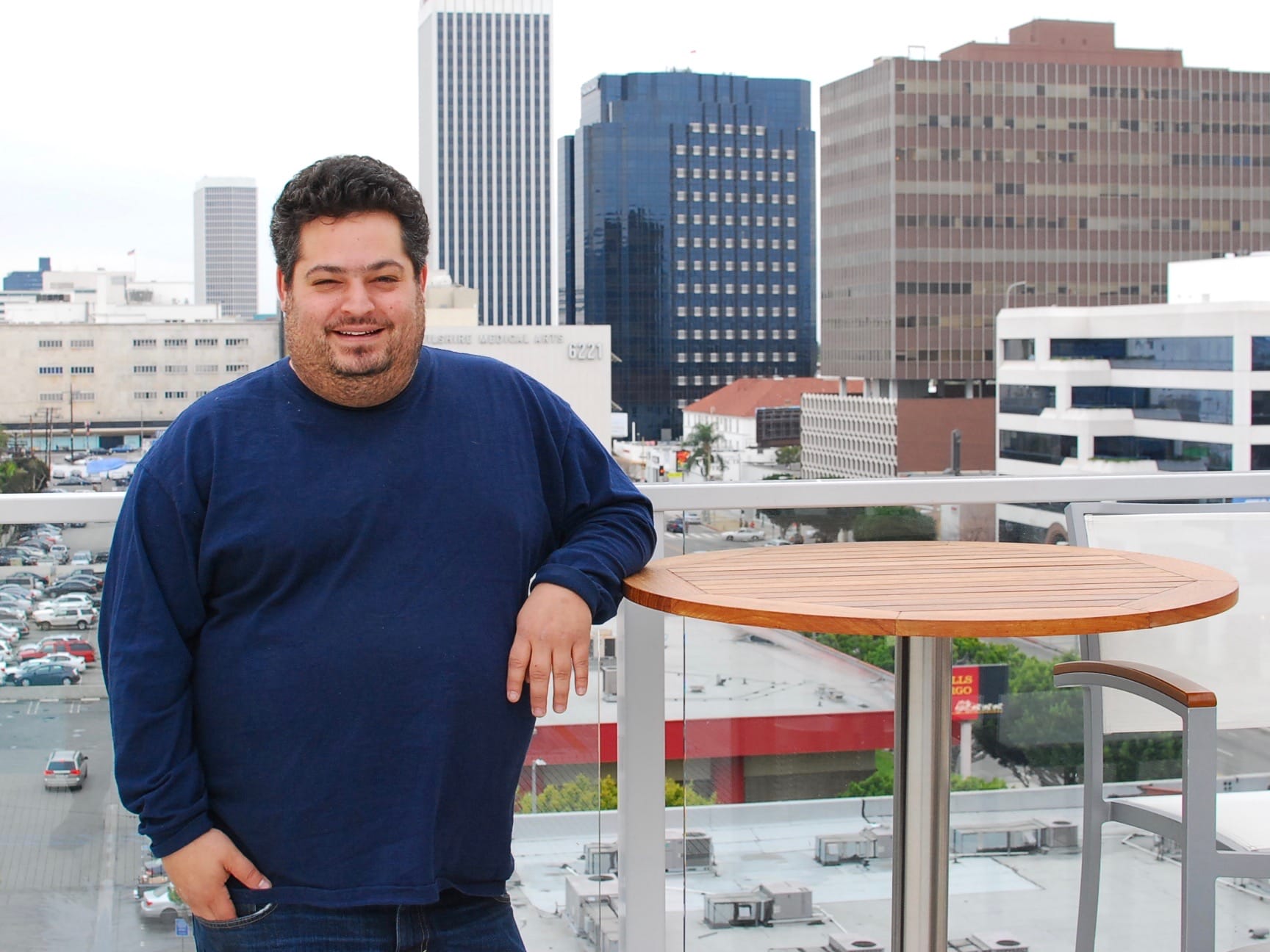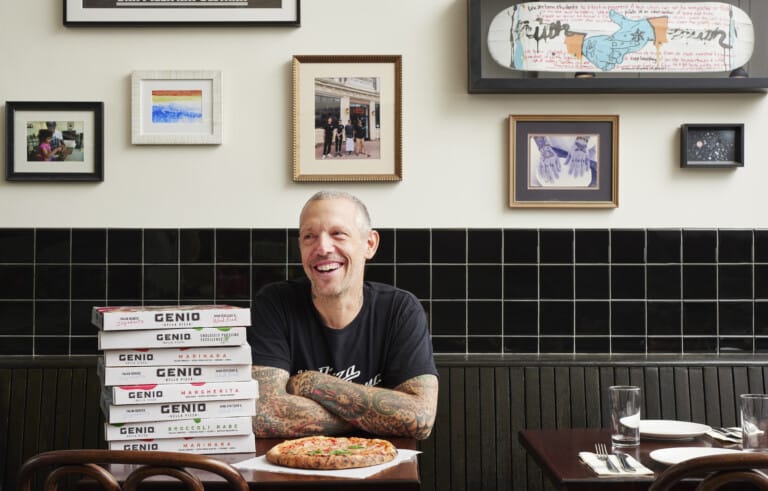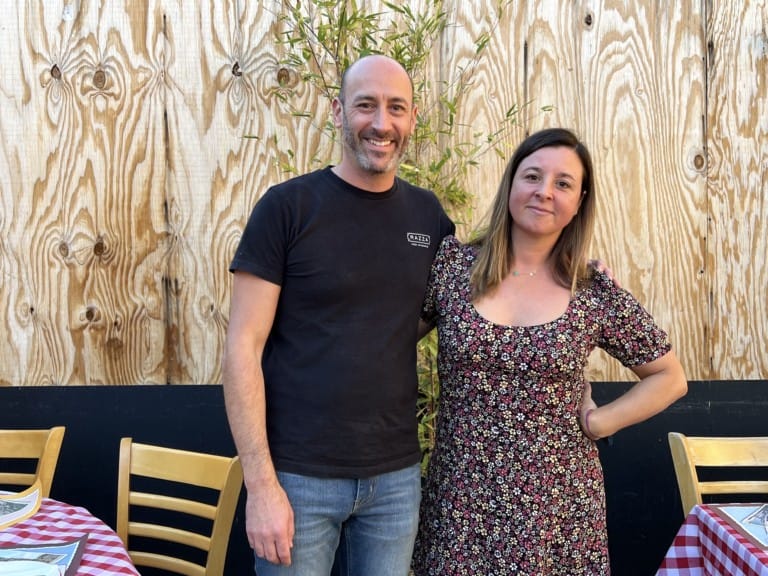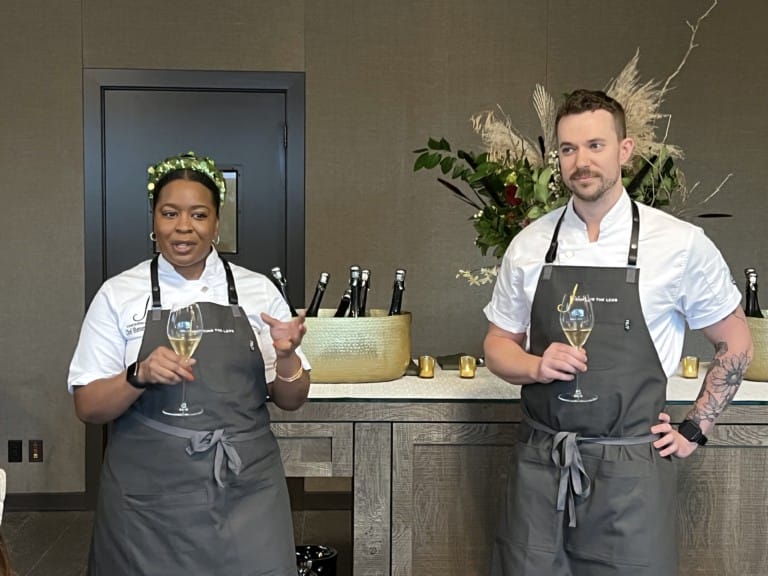Eric Greenspan is a fellow New Jersey native who spent his formative years in Fullerton and Calabasas, which is where he fronted a punk band called The Green Armpits. He took that punk rock mindset to Berkeley, where he majored in Entrepreneurship and Marketing. He eventually became an entrepreneur, after he attended culinary school, worked for legendary French chefs like David Bouley and Joachim Splichal, and led the kitchen at the illustrious Patina restaurant. Greenspan opened his first restaurant, The Foundry on Melrose, in 2006. Five years later, he formed the Foundation Hospitality Group with Jay Perrin and Jim Hustead, which allows them to open and operate multiple concepts. They started with The Roof on Wilshire in September, as a prelude to launching a fine dining restaurant on the boutique Hotel Wilshire’s second floor called Étage, and a fast casual concept by The Foundry called Greenspan’s Grilled Cheese. He’s also appeared on TV, including a victory against Bobby Flay in Kitchen Stadium on “Iron Chef America,” as a competitor on “The Next Iron Chef,” and as the host of “Fix This Kitchen” on A&E. On February 7, we met at The Roof on Wilshire, and Greenspan shared several culinary insights.
What was your first chef’s job?
My first chef’s job was this café in Berkeley called the Café Med. That was where I got my first line-cooking job. That was my first dishwashing job, and I worked my way up to being the chef and manager of the whole property. It sounds more grandiose than it was. It’s a small little breakfast café. I’m hoping to retire there one day.
Nobody taught me how to make Hollandaise. I didn’t know that you could keep it, so I used to make it fresh every time somebody orders an eggs Benedict. I had a rhythm down to how I’d make Hollandaise to order, scratch, every time anybody ordered an eggs Benedict. So when I changed the menus over to a chalkboard menu there, I told them, “Look, don’t make the egg Benedict too big, because I hate making them.” The wiseass who made the chalkboard wrote, in a box, “Eggs Benedict. Eric’s favorite.” I thought it was funny, so I kept it. For me, as long as it’s funny, that’s all that really matters. It got bought out by some Korean family, and if you still go to the café right now, all these different menus they now have all these shitty, soulless, boring menus, and it still says, “Eggs Benedict. Eric’s favorite.”
Is Café Med still going strong?
It is. That café was there since the ’40s. It’s where Ginsberg wrote “Howl.” A lot of the student uprisings were planned at the Café Med. It was kind of a real central, social hub in the ‘40s, ’50s and ’60s, and it sort of had its heyday back then, but it’s still around. I would love to restore it one day, when I’m done with this town.
What was your very night like there?
It was crazy. The very first night wasn’t crazy. It was my very first dishwashing job, and I did about five hours of washing dishes, and the dishwashers there told me to slow down, to calm down, I was making them look bad. So I went to the owner and asked him if he’d let me work in the kitchen, and he said, “What do you know how to do?” I pushed start on the microwave. “That’s what I know.” He had a sense of humor, so he hired me. For two weeks, I worked under this ex-con speed addict Creole dude named Richard. Used to call me College Boy. And then Richard and his lead cook walked out one day because they thought the owner was trying to push ‘em out. Standard methamphetamine induced psychosis, I guess. It was a Sunday morning in a breakfast joint that was doing about 400 covers, and the boss asked me if I could do it. “Sure, I’ll figure it out.” I had to flip four eggs over easy for every one I actually served. I was in the shits the entire day. Did about 400 covers by myself though, without much training, and that’s when I decided I was going to do this for a living.
Was it a given you’d become a chef, or did you consider other careers?
I always wanted to be my own boss. Not that I wanted to be my own boss. I always knew I kind of had to be my own boss, just my temperament and mentality. Ask any of my former bosses. They’ll agree. That’s why I got fired so much early in my career. I’m very headstrong and I’m very opinionated. I’ve learned from being a partner in the Foundation Hospitality Group to tailor that and mellow out. I always wanted to be my own boss. I always thought that restaurants or bars, that would be a way to do that. I never knew I wanted to be a chef until I started cooking, and then I got hooked on this sense of cooking. Breakfast cooking, you’ve got five to seven minutes to get 20 things right. And when you get that done, you’ve got 20 more things to do, and I get off on that shit. I get off on accomplishing stuff and getting things done, so I figured I’m a Jewish kid from Berkeley, who’s brother’s a doctor, I’ve got to find some way to make my parents impressed. I couldn’t flip eggs the rest of my life, so I had to go into fancy schmancy food.
What did you major in at Berkeley?
Business. Entrepreneurship and Marketing.
I imagine that helps you in what you do now.
You know, it does. It’s funny. I remember Joachim at Patina yelling at me one day because my food cost was out of control and I told him to raise the prices. It’s funny because he said, “Didn’t you go to business school? What did you learn in business school?” And I said, “I learned that every business is completely different than this business,” which is very true. The standard things I learned in business didn’t prepare me for this business, but a lot of the marketing stuff I learned, it was good to get a brief introduction to a lot of different fields, because in this field as a restaurateur, you have to wear all sorts of different hats. You have to have a good understanding of accounting. I’m good at accounting, and have a good understanding of accounting, and finance, and marketing and organizational behavior and human resources, and to have a good background in all that stuff, it’s a lot of culinary school. You don’t learn anything in business school. You learn how to learn. You learn all the things to look for, and all the terms, so when you actually learn how to do it, you’re not completely in the dark.
What do you look for when you’re hiring somebody to work in one of your kitchens?
Working in the kitchen, I look for fire. I look for fire and confidence, that’s it. I don’t care if you’ve never worked a day in your life. If you’ve got that look in your eye like you want it, and you’ve got that fire to get into the kitchen to hustle and work hard and try to be better every day, that’s all I need. In fact, the majority of the cooks who have come through my schools – shall we say – never went to culinary school. Both chefs who run my operations right now, neither went to culinary school. I might be the only one in the company who did.
Do you feel like it was important that did?
For me, it was important because I needed to know – even working at Ducasse – the biggest thing I learned working at Ducasse was, “That’s it?!” That’s the difference? It seems so common knowledge, certain things that you need to do. If you’ve never seen it, you wouldn’t know. Plus I was starting in professional cooking, I was 22 years old, not including my three years as a short order cook. But I was 22 years old and figured school would give me that head’s up. While I was at school, I was cursing the day that I ever spent money on it, but I was in Paris. I might not recommend culinary school to everybody, but I would definitely recommend living in Paris for a year, because you learn about food just by living in Paris.
What was important for you in finding partners for Foundation Hospitality Group?
Look, when I started at The Foundry, I was alone, and it caused me problems that I’m still recovering from now. One person can’t do it alone, and I’ve always had goals of other opportunities, and not just having The Foundry. This day and age, if you position yourself right, the goal as a chef should be to market yourself in such a way that’s not just fine dining, it’s not just grilled cheese sandwiches, it’s a lot of different ideas that I have as far as concepts, but you can’t do it yourself. For me, the beautiful thing about the Foundation Hospitality Group is that together we accomplish more. I can do the food for four or five different projects. A partner like Jim Hustead can help me with strategic growth and planning, and a partner like Jay Perrin can run the fronts of the houses and put the systems in place and do the cost analysis necessary to keep it going. Obviously one restaurant couldn’t provide for three of us, but four restaurants sure could. Or you could say, if I ran three restaurants, the food would be very good, and the rest of the restaurant would suck. If Jim ran three restaurants, they’d be strategically well aligned, but everything else would suck. If Jay ran three restaurants, the service would be great, and the wine list would be great, and the cost would be in line, but everything else would suck. But us together, spreading our influence, makes for three, four, five, six, multiple strong units in general. We can each focus on what we do best, and frankly yield to somebody who’s frankly better at it than we are.
Do you see signature dishes as a positive thing?
I think so. I think signature dishes are a positive thing. They definitely put you in a box, which is a dangerous place to be sometimes, but also kinds of put things in perspective. For God sakes, the grilled cheese sandwiches is my signature dish. I’ve worked my life in Michelin-starred restaurants, and at first, it’s like, “Oh my god, I’m the grilled cheese guy.” When you first look at it from an outside perspective, “Oh, there’s so much more to me.” But at the end of the day, grilled cheese has done me right, and Greenspan’s Grilled Cheese is going to be a phenomenal experience when we get it open, and it’s going to make me some money, and it’s going to be fun, it’s going to be approachable, and it’s going to make us new friends. And it has served as a brilliant stepping stone into all sorts of other things that we do. So I think signature dishes are a great thing, but you can’t just rest on them alone. You need to constantly try to stay invigorated and stay focused and do new stuff. I’ve been trying to find a new signature dish. That’s why I rolled out the Big 45 at The Foundry, or the two-and-a-half pound lobster that we did, or the pancake lasagna. What else can something spin off of, or can we vibe off of, or can represent us but remain approachable and still bring people in? That’s what a signature should be. A signature should be the way of getting people in the door to experience everything we do in totality.
What’s your favorite part about owning restaurants?
The people. Teaching. Shaping people’s lives, and not just customers. Obviously it’s important to take customers and make sure you have an impact on their experience, and that they have a good time, but for me, having a team – I’ve got 80 employees that work for me now – that’s 80 families that depend upon me and what I do, and how I lead them, to feed their families. That’s a lot of responsibility, but there’s a lot of joy that comes from watching people get better at their jobs, and watching people excel, and watching people accomplish other things in their lives. My expediter at The Foundry recently became a grandpa, and it’s cool to be a part of that. I like the family aspect. I like the aspect of teaching people not just to cook and work in the restaurant business, but as scary as it sounds, teaching people how to life and giving guidance to a young busboy who wants to go to college, and what he should do to do that. Or to a cook who wants to open up his own restaurant, and what steps should he take. Or somebody who doesn’t know what they want to do, and encouraging dishwashers to take English classes. And then only speaking to them in English, to help them become a better citizen, and a better person. I really, really value that. I really value the personal relationships. At the end of the day, as a restaurateur, you can look at that as your biggest damnation, because labor cost is what kills every restaurant, or your biggest blessing. I have so many people coming into my life, and me being able to affect their lives, and have an impact on their lives, and create a relationship that hopefully lasts a long time.
What’s the criteria for a dish that goes on the menu at The Foundry, and is that different from at The Roof?
There’s definitely a difference. Criteria 1, is it delicious? Obviously. At The Foundry, the criteria is very much based on, can we execute it on a busy night as well as on a slow night? Is it imaginative enough to satisfy people in their understandings of the food we do there? Is it approachable enough to fit into the style of that restaurant, which is the tweaking of American comfort foods? That kind of modern American thing. But at The Foundry, we limit it to, does it taste good and is it awesome? If we look at it and go, “Yeah, that sounds cool!,” good. That all that it takes at The Foundry.
Here [at The Roof on Wilshire], it’s very important to make sure that it’s accessible, because 50% of the people that come here aren’t here for the Eric Greenspan experience. They’re here for the, “Hey, I’m staying in the hotel and want a burger” experience. “I can give a fuck who’s cooking, I just want something to eat.” So we’ve got to make sure the food here is accessible, and yet still true to what our regular clients are looking to in us. So we have to be kind of sneaky. Is it a club sandwich? Yes. Is there something unique about the club sandwich that makes it also suitable for – “Is that Eric Greenspan’s club sandwich?” – Yes. So there’s that.
Downstairs [at Étage] is very much going to be about, is it worth the price? Can it fit into the grandeur and choreography of what we’re looking to do down there? Is it executable? I have a very challenging kitchen down there. So there’s that.
On the menu for Greenspan’s Grilled Cheese, it’s, does it make you smile? Does just the thought of it – not the taste of it – because you’ve got to realize too, and this goes in all the dishes that we make – the last sense that somebody uses to judge your food is taste. It starts with sight, how it reads on the menu or how it looks as it comes to your table, how it sounds when you’re biting into it, how it feels when you’re biting into it, how it smells, then at the end it’s taste. It really starts with, “Does it sound delicious on the menu?” It sounds so cold to say at the end of the day that it’s mainly due to marketing, but it really is. I won’t put it on the menu if it sounds disgusting, even if I know it will work. Maybe at a beer dinner or a wine dinner, because that’s the fun of it all, because somebody might say, “Oh yeah, I tried that, and it wasn’t disgusting.” That doesn’t accomplish shit. It’s gotta read, “That sounds fucking delicious.” My thought is that if it sounds delicious, it’s gonna be delicious. Then all we’ve got to do is make it delicious. A little salt, butter, lemon juice, you’re good.
Would you say that you’ve had any mentors over the years?









Blog Comments
Krista Simmons
March 23, 2012 at 11:57 AM
great interview, josh! interesting to hear what he takes into consideration when creating unique menus for each location. he really takes all the details into consideration. good luck greenie!